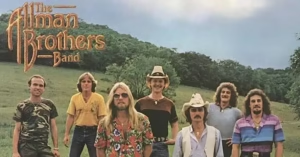The Rolling Stones: The World’s Greatest Rock and Roll Band
The Rolling Stones. Formation and Early Years
The Rolling Stones were formed in London in 1962, founded by:
- Mick Jagger – Vocals
- Keith Richards – Guitar
- Brian Jones – Multi-instrumentalist
- Charlie Watts – Drums
- Bill Wyman – Bass
Initially rooted in Chicago blues and R&B, the Stones were seen as the rebellious alternative to , known for their raw attitude and streetwise image.
Their name was inspired by a song, “Rollin’ Stone,” signaling their deep commitment to blues authenticity.
The Rolling Stones. Musical Style and Characteristics
The Stones’ sound evolved across decades, but core elements include:
- Gritty blues-based rock
- Swaggering, soulful vocals (Jagger)
- Signature guitar interplay between Richards and later Ron Wood
- Themes of lust, danger, politics, and decadence
- Incorporation of country, reggae, disco, and funk
They’ve released over 30 studio albums, blending consistency with reinvention.
The Rolling Stones. Breakthrough Albums and Career Highlights
✦ Out of Our Heads (1965)
Featured their first U.S. #1 hit, “(I Can’t Get No) Satisfaction”, powered by a fuzzbox riff and a rebellious snarl — a song that defined the spirit of the ‘60s youth.
✦ Aftermath (1966)
First album of entirely original material. Songs like “Under My Thumb” and “Paint It Black” showcased the band’s darker lyrical edge and Eastern musical experimentation.
✦ Beggars Banquet (1968)
A return to rootsy, acoustic-based blues. Includes the timeless “Sympathy for the Devil” and the apocalyptic “Street Fighting Man.”
✦ Let It Bleed (1969)
Features the haunting “Gimme Shelter,” country-tinged “You Got the Silver,” and epic “You Can’t Always Get What You Want.” Released just before founding member Brian Jones died, and Mick Taylor stepped in.
✦ Sticky Fingers (1971)
First album on their own label (with the famous Andy Warhol zipper cover). Introduced “Brown Sugar,” “Wild Horses,” and solidified their Southern rock and blues fusion.
✦ Exile on Main St. (1972)
A sprawling, murky double LP often hailed as their masterpiece. Raw, loose, and drenched in Americana. Highlights include “Tumbling Dice” and “Rocks Off.”
✦ Some Girls (1978)
A response to punk and disco — and proof they could adapt. Features “Miss You,” “Beast of Burden,” and “Shattered.”
The Rolling Stones. Turbulence and Continuity
Despite legal troubles, addiction, and interpersonal conflict (especially the famous Jagger/Richards feuds), the Stones have remained remarkably durable.
Key departures:
- Brian Jones (died 1969)
- Mick Taylor (left 1974)
- Bill Wyman (retired 1993)
Ronnie Wood joined in 1975 and became a permanent fixture, while Charlie Watts remained the band’s heartbeat until his passing in 2021.
The Rolling Stones. Later Years and Recent Activity
Despite their age, The Rolling Stones have continued to tour stadiums, release music, and defy expectations.
✦ Blue & Lonesome (2016)
A surprise return to their blues roots, covering Jimmy Reed, Howlin’ Wolf, and others. Raw, live, and full of grit.
✦ Hackney Diamonds (2023)
Their first album of original material in nearly 20 years — a sharp, defiant return featuring guest spots from Paul McCartney, Lady Gaga, Elton John, and drummer Steve Jordan, following Watts’ passing.
Legacy and Cultural Impact
The Rolling Stones are widely regarded as one of the greatest rock bands of all time:
- Over 200 million records sold
- Pioneers of the arena rock tour
- Defined the sex, drugs, and rock ’n’ roll lifestyle
- Shaped the evolution of blues-rock, hard rock, and even punk
- Honored with multiple Grammy Awards, a Rock and Roll Hall of Fame induction (1989), and global reverence
They influenced artists as varied as The Black Keys, Aerosmith, The Strokes, Oasis, and .
Interesting Facts
- The tongue-and-lips logo was designed by John Pasche and has become one of the most recognizable symbols in music history.
- They were banned from several U.S. cities in the ’60s for their rebellious behavior and image.
- Altamont (1969), their free concert with Hell’s Angels as security, ended in tragedy — a turning point in rock history.
- Charlie Watts was often called “the quiet Stone” — a jazz-trained drummer known for his restraint and precision.





